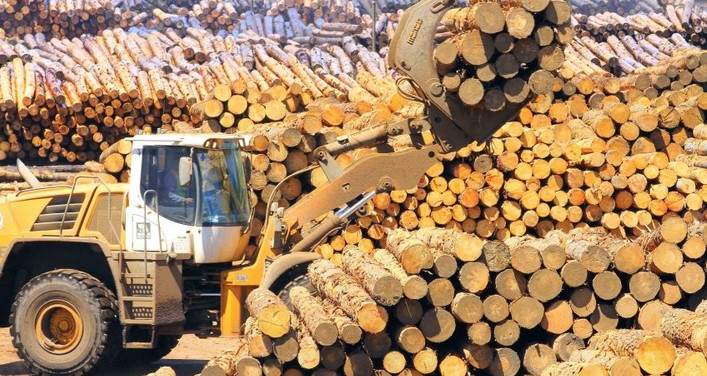- Retail, healthcare, and education also made the list of those consulted, based on the productive profile of the Region. Business associations are concerned about the situation of SMEs.
Regional productive sectors such as forestry, fishing, retail, ports, healthcare, and education would be among the most viable for applying a potential sectoral or multi-level collective bargaining bill announced in the recent public address by President Gabriel Boric, according to labor leaders in the area.
Iván Montes, spokesperson for the Table for the Defense of Employment and Industry in the Biobío Region, stated that "this announcement made in the presidential address is a proposal that will materialize into a bill, which we will surely support as a table. This proposal would provide an opportunity to regulate matters between the involved parties that current laws do not cover."
On the specific sectors that could benefit in the Region, Iván Montes said, "Clearly, the port sector, for example, retail, or groups of contractor workers, whether in services or industrial maintenance. We will have to analyze whether the bill includes, for instance, sectoral negotiation processes, beyond the collective bargaining each union organization may have. Ultimately, it is a proposal that will need to be evaluated on its merits once the government presents the bill."
Meanwhile, José Quiñilen, leader of the Arauco Pulp Union, expressed regarding the presidential announcement that "it is an idea that could benefit workers because it brings some fairness to different labor sectors. But before this discussion begins, we must consider that progress is still needed in better categorizing SMEs, as currently, some SMEs are placed on the same level as larger companies. So, when sectoral bargaining occurs, and it is determined beforehand who will be the judge enforcing or overseeing the resulting agreements, SMEs may be held to compliance standards they lack the resources to meet. In short, before advancing multi-level collective bargaining bills, we must set our house in order with clear and more realistic regulations and categorizations."
Additionally, the Arauco Pulp Union leader noted that the sectors where sectoral bargaining could work best in the Region are those like "healthcare and education—there, sectoral bargaining fits perfectly," he affirmed.
When asked if the forestry sector could also be considered one of the most viable for applying potential new multi-level collective bargaining regulations, José Quiñilen replied, "Of course, due to logistical reasons. It’s worth remembering that almost 63% of forestry activity is concentrated in a single Region (...) the forestry sector could be ideal to start this type of negotiation in the industrial sector, just like the fishing sector. Perhaps they could serve as pilot sectors to begin discussions."
From the Federation of Fishing Industry Workers' Unions of the Biobío Region (Fesip), chaired by Juana Silva, they indicated they are analyzing the Executive's announcement and will prepare a statement likely to be released before the week ends.
Business Associations
Michel Esquerré, president of Pymemad, was emphatic in stating, "We have had a very clear position on all these discussions. The State is blind when it comes to defining what an SME is in Chile. To explain, a bakery in Hualpén selling over 100,000 UF (Unidades de Fomento) per year is classified the same as Walmart or Jumbo, or a forestry company selling over 100,000 UF is classified the same as CMPC and Arauco. There’s a dichotomy here—until the State understands what an SME is in each productive sector, it cannot make distinctions to assess how laws affect them in areas like taxation or labor."
Specifically, on the sectoral or multi-level collective bargaining proposal, the business leader noted, "Before discussing such proposals, the State must modernize and systematize SME classifications to understand what an SME is and how laws impact their development. We believe Chile, given its economic concentration, will not progress without real support for SMEs (...) We first need a proper diagnosis of what each SME represents in every productive sector."
Álvaro Ananías, president of CPC Biobío, pointed out that "when 62% of our labor force in Biobío is concentrated in small and medium enterprises, sectoral bargaining would indeed harm entrepreneurs and business owners in our Region. If collective bargaining by activity branch is implemented, many companies won’t withstand the conditions, as a distinction must be made where large companies might adapt, but SMEs likely cannot. This could trigger a crisis in the economic development and growth of SMEs, which drive the Region."
Another key point for the CPC Biobío president is that "we must also consider recent legislation like the 40-hour workweek, which already poses difficulties for them. If measures like sectoral bargaining are introduced, they would be further affected, and the main goal should be supporting their growth."
It should be noted that the Biobío Industrial Fishermen’s Association, when consulted by Diario Concepción, indicated they would not comment on the matter for now.
Sandra Quintana, Regional Minister of Labor and Social Security of Biobío, affirmed that "we expect this proposal to be drafted into a bill before the end of 2024."
Sandra Quintana added, "This multi-level negotiation has studies worth highlighting to strengthen collective bargaining. With this, we can expect to prevent and resolve some workplace conflicts that currently take too long to address, leading to strikes and layoffs. We believe that with strengthened tools, these situations will no longer persist."
Source:diarioconcepcion.cl







Comentarios (0)
No hay comentarios aún. ¡Sé el primero en comentar!
Deja un comentario